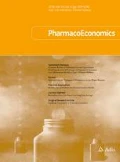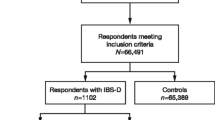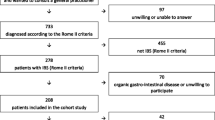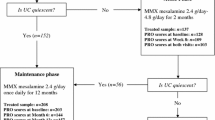Abstract
Objectives: To identify the impact of irritable bowel syndrome (IBS) on health-related quality of life (HR-QOL), time off work and the utilisation and cost of health services.
Design: A case-control study was undertaken matching patients with IBS and controls. Quality-of-life information was collected using the Medical Outcomes Study 36-item Short Form (SF-36) health survey, EuroQOL instrument (EQ-5D) and IBS Quality-of-Life (IBS-QOL) instruments. Data on time off work was also collected. National Health Service (NHS) resource use in primary and secondary care was estimated by review of general practitioner (GP) and hospital records over a 12-month period.
Setting: Recruitment was from six GPs’ surgeries in the Trent Region of the United Kingdom.
Participants: 161 patients with IBS, as defined by the Rome Criteria I were recruited. These were compared with 213 controls matched for age, sex and social characteristics.
Main outcome measures: SF-36 and EQ-5D scores; mean number of days off work; mean NHS costs per person during the 12-month study period.
Results: Patients with IBS had considerably lower HR-QOL than controls. They scored worse in all dimensions of the SF-36 and the EQ-5D and they had more time off work. On average patients with IBS cost the NHS £123 (95% confidence interval: £35 to £221, 1999 values) more per year than individuals in the control group (p = 0.04).
Conclusions: IBS affects patients through reduced quality of life, more time off work and greater healthcare utilisation than a control group of patients without IBS. The difference in quality of life was pronounced and unusual in that it was influential in every dimension of both the SF-36 and the EQ-5D.






Similar content being viewed by others
References
Schlemper RJ, Van Der Werf SDJ, Van den broucke JB, et al. Peptic ulcer, non-ulcer dyspepsia and irritable bowel syndrome in the Netherlands and Japan. Scand J Gastroenterol 1993; 28 Suppl. 200: 33–41
Jones R, Lydeard S. Irritable bowel syndrome in the general population. BMJ 1992; 304: 87–90
Jailwala J, Imperiale TF, Kroenke K. Pharmacologic treatment of the irritable bowel syndrome: a systematic review of randomized, controlled trials. Ann Intern Med 2000; 133 (2): 136–47
Camilleri M, Northcutt AR, Kong S, et al. Efficacy and safety of alosteron in women with irritable bowel syndrome: a randomised, placebo-controlled trial. Lancet 2000; 355 (9209): 1035–40
Prather CM, Camilleri M, Zinsmeister AR, et al. Tegaserod accelerates orocecal transit in patients with constipation-predominant irritable bowel syndrome. Gastroeneterology 2000; 118 (3): 463–8
Wells NEJ, Hahn BA, Whorwell PJ. Clinical economics review: irritable bowel syndrome. Aliment Pharmacol Ther 1997; 11: 10119–1030
Haycox A, Einarson T, Eggleston A. The health economic impact of upper gastrointestinal symptoms in the general population: results from the domestic/international gastroenterology surveillance study. Scand J Gastroenterol 1999; 34 Suppl. 231: 38–47
Hahn BA, Yan S, Strassels S. Impact of irritable bowel syndrome on quality of life and resource use in the United States and United Kingdom. Digestion 1999; 60: 77–81
Harris MS. Irritable bowel syndrome. A cost effective approach for primary care physicians. Postgrad Med 1997; 101: 215–26
Brazier JE, Harper R, Caithain A, et al. Validating the SF-36: a new outcome measure for primary care. BMJ 1992; 305: 160–4
Harper R, Brazier JE, Waterhouse JC, et al. A comparison of outcome measures for patients with chronic obstructive pulmonary disease (COPD) in an outpatient setting. Thorax 1997; 52: 879–87
EuroQoL Group. EuroQol- a new facility for the measurement of health-related quality of life. Health Policy 1990; 16: 199–208
Brooks RG. EuroQoL- the current state of play. Health Policy 1996; 37: 53–72
Hahn BA, Kirchdoefer LJ, Fullerton S, et al. Evaluation of a new quality of life questionnaire for patients with irritable bowel syndrome. Aliment Pharmacol Ther 1997; 11: 547–52
Netten A, Dennett J. Unit costs of health and social care. Canterbury: Personal Social Services Research Unit, University of Kent, 1997
NHS Trust. NHS Trust financial returns. London: Department of Health, 1997/98
Monthly Index of Medical Specialities (MIMS). London: Haymarket Medical Ltd, 1999 Jan
Brazier J, Harper R, Munro J, et al. Generic and condition-specific measures for people with osteoarthritis of the knee. Rheumatology 1999; 38 (9): 870–7
McCabe CJ, Thomas KJ, Brazier JE. Measuring the mental health status of a population: a comparison of the GHQ-12 and the SF-36 (MHI-5). Br J Psychiatry 1996; 169: 517–21
Drossman DA, Li Z, Andruzzi E, et al. U.S. Householder Survey of Functional Gastrointestinal Disorders: prevalence, sociodemography and health impact. Dig Dis Sci 1993; 38 (9): 1569–80
Paterson WG, Thompson WG, Vanner SJ, et al. Recommendations for the management of irritable bowel syndrome in family practice. CMAJ 1999; 161: 154–60
Acknowledgements
This work was commissioned and funded by Novartis Pharma AG, Basel, Switzerland. The views expressed here are those of the authors and not necessarily those of Novartis. The authors declare no competing interests, and would like to thank Professor Jon Nicholl from ScHARR for substantial and helpful comments made on an earlier draft of this paper.
Author information
Authors and Affiliations
Corresponding author
Rights and permissions
About this article
Cite this article
Akehurst, R.L., Brazier, J.E., Mathers, N. et al. Health-Related Quality of Life and Cost Impact of Irritable Bowel Syndrome in a UK Primary Care Setting. Pharmacoeconomics 20, 455–462 (2002). https://doi.org/10.2165/00019053-200220070-00003
Published:
Issue Date:
DOI: https://doi.org/10.2165/00019053-200220070-00003




